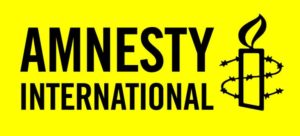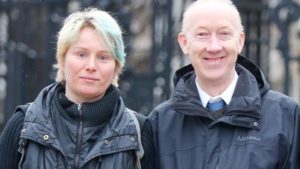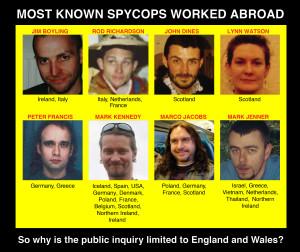Amnesty International Demands Widening of Spycops Inquiry
 Amnesty International has joined the struggle for justice in the spycops scandal, backing a legal case by victims to get the public inquiry into Britain’s political secret police extended to cover Northern Ireland.
Amnesty International has joined the struggle for justice in the spycops scandal, backing a legal case by victims to get the public inquiry into Britain’s political secret police extended to cover Northern Ireland.
When the Undercover Policing Inquiry’s remit was announced three years ago, campaigners were shocked to see it was limited to:
‘undercover police operations conducted by English and Welsh police forces in England and Wales since 1968’
Though the Inquiry will cover operations starting in 1968, when the Special Demonstration Squad was formed, it will nonetheless ignore much of the spycops’ activity. A large proportion of the known undercover officers went beyond England and Wales – most of the independently profiled officers were in Scotland and several in Northern Ireland (as well as 15 other countries beyond the UK government’s jurisdiction).
The German government formally requested inclusion in the UK inquiry in 2016. In September 2017, Irish MEP Lynn Boylan hosted an event at the European Parliament which not only covered British spycops abroad but also the array of unaccountable political police officers crossing borders. It is possible that these efforts could be building towards future cases coming to the European Court of Justice.
Whilst in all these places, the spycops engaged in many of the shocking activities that the inquiry is supposed to examine. There are many officers who were there whilst deceiving women into intimate relationships, something the Metropolitan Police has conceded is an abuse of police power and a violation of human rights.
SPYCOPS AROUND THE UK
Though the complaints from Germany and other places outside the UK lie beyond the power of the Undercover Policing Inquiry to rule on, there is no excuse for excluding Scotland and Northern Ireland.
Spycops didn’t just extend their abuses from England and Wales into these places, they also got involved in some specific local issues. In Northern Ireland at least one Special Demonstration Squad officer, Mark Jenner, visited to get in to Irish politics and was involved in a confrontation with police officers in 1995.
The Police Service of Northern Ireland says it appears police there were unaware of Jenner’s presence, and that the Met sent him in without any co-ordination of briefing from local officers.
The Police Service of Northern Ireland has described the SDS decision to do this as:
‘an act of madness’
Given the Special Demonstration Squad had an officer, Rick Gibson, taking active organisational roles in the Troops Out Movement twenty years earlier in the 1970s, it seems likely that Jenner wasn’t the first of their spycops to be involved in Irish politics.
The public inquiry cannot fulfil its purpose by only looking at part of the facts. It cannot be right that human rights abuses in England and Wales warrant a full public inquiry while the same acts by the same officers in Scotland and Northern Ireland get no answers or redress.
FIGHTING FOR INCLUSION IN SCOTLAND
The pressure for inclusion has been strong in Scotland, where Neil Findlay MSP has initiated two parliamentary debates on the subject. This culminated in repeated formal requests by the Scottish government – supported by every party in the parliament – for the Home Office to include the country in the Inquiry.
After the initial refusal from the Home Office, the Scottish government ordered a review of spycops in Scotland by HM Inspectorate of Constabulary in Scotland. This body of career police officers is not independent which, coupled with the review having a narrow remit, meant that spycops’ victims boycotted the whole process.
The HMICS report was published in February 2018 and, as expected, it was a whitewash. On the basis of its conclusions, the Scottish government has decided not to have its own spycops inquiry. This makes it all the more import to get Scotland included in the main public inquiry process. Without this, we will never know the truth about political undercover policing in Scotland.
Two spied-upon activists have launched legal challenges to the imbalance, separately securing the right to a judicial review of then-Home Secretary Theresa May’s decision to exclude Scotland and Northern Ireland.
In Scotland, Tilly Gifford was initially denied legal aid because the case supposedly ‘had no merit’.
She crowdfunded the costs and won the right to a judicial review yet was still refused legal aid until persistent campaiging forced the Scottish Legal Aid Board to grant it last month.
FIGHTING FOR INCLUSION IN NORTHERN IRELAND
In Northern Ireland, Jason Kirkpatrick has brought a case for a judicial review in Belfast. He had an easier time than Gifford in getting to court but since then – as with other spycops victims in every legal process on their issue – he has been faced with governmental delay tactics.
In February 2017 the Belfast High Court ruled that a call to extend the UCPI to Northern Ireland should go to full Judicial Review within the next few months, but delays by the NI Secretary of State office and the Home Office have dragged the process out.
After a year with no action in the case, last week Amnesty publicly called on the Home Secretary and Secretary of State for Northern Ireland to act now and extend the public inquiry.
‘Northern Ireland must not be left behind due to the ongoing absence of government ministers advocating in our interests.
‘Activities of undercover police were not limited to England and Wales, so nor should the inquiry. Two previous Justice Ministers have called for the extension of the Inquiry which we believe must now happen urgently.’
Kirkpatrick told Radio Foyle about the counter-democratic policing he’d been subjected to:
‘In 2005 I met this undercover officer, Mark Kennedy, in Dublin. He travelled around with me and others, he paid for the trip. We drove from Dublin to the west of the Republic and then on up to Belfast, giving lectures about environmental issues and so forth. In Belfast we were at the City Church, a cross-community church. I became his friend, we were very close friends I thought, for five years.’
Kirkpatrick told the Belfast Telegraph:
‘The operations and depth of the deception by the police who spied on me was not limited to England and Wales and so neither should the investigation. Our rights must be upheld. I’ve been fighting for what’s right on this case since 2010 and it’s time the Government stop doing everything in its power to prevent justice.’
Amnesty’s Northern Ireland Campaigns Manager, Grainne Teggart, added:
‘Victims, such as Jason, should not have to take to the courts to have their rights realised. Those affected deserve nothing less than the truth around covert operations that violated trust, privacy and intimacy.’
Dates for the judicial reviews in Northern Ireland and Scotland have yet to be set. But given that the Undercover Policing Inquiry is still working through its preliminary issues, there is still time for the Home Office to extend the geographical boundaries of its remit.
Britain’s political secret police didn’t stop at national borders, so neither can a credible, thorough inquiry into their deeds.


 The German government have formally asked to be included in the forthcoming
The German government have formally asked to be included in the forthcoming